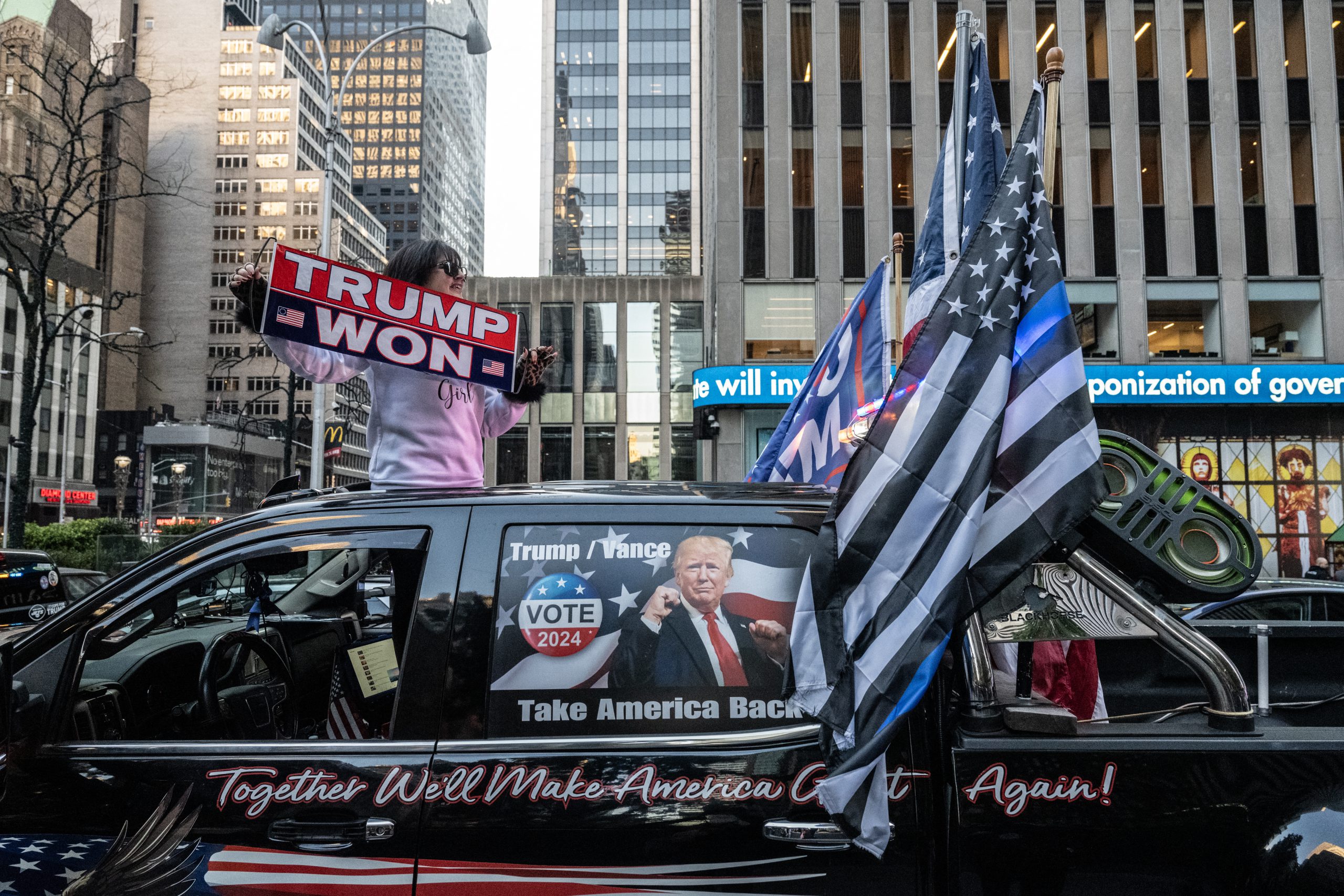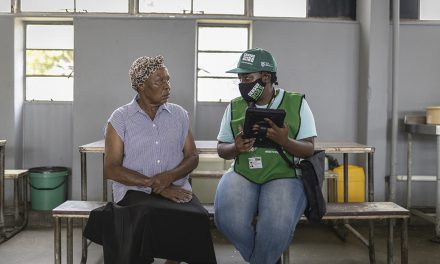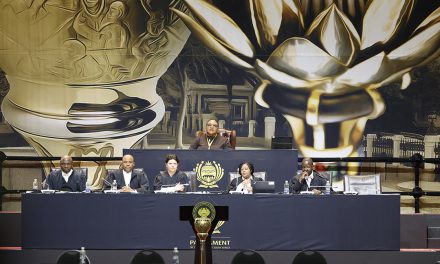Donald Trump, to the chagrin of many, is firmly re-established in the White House. The day before the election, The Economist predicted a Kamala Harris win, but its model appeared to be overly sensitive to small-sample polls and insufficiently sensitive to Trump’s popularity in the swing states. Most pundits and Western media are horrified at the prospect of Trump in the White House, and his past record of engagement with African countries leaves much to be desired. How is it that the leader of the free world is again a man who appears to lack moral fibre, integrity and compassion for the poor?

NEW YORK – NOVEMBER 9: People participate in a car caravan in support of US President-elect Donald Trump on November 9, 2024 in New York City. Photo by STEPHANIE KEITH / GETTY IMAGES NORTH AMERICA / Getty Images via AFP
It is easy to point fingers at any US administration, of course. The rest of the world has depended on it for too long to maintain the “post-Cold War multilateral rules-based order”. This order has fractured severely since the global financial crisis of 2008. China has become less open, and Xi Jinping continues to tighten his grip over a Chinese Communist Party increasingly committed to rewriting history and suppressing civil liberties. China has also supported Russia’s rules-violating territory expansion grabs. US and European support for Ukraine’s defence has been laudable, but as Richard Haas recently pointed out, the current strategy makes for an unwinnable war. Growing domestic fractiousness within the US and across the EU, combined with the extensive opportunity costs of funding expensive wars, has rendered Russia bolder than ever. This is not helped by Iran now openly supporting Russia, coupled with major instability in the Middle East.
Within the US, the domestic landscape is fractious. AI-driven disinformation poses a serious threat to national harmony and is being weaponised by rogue players not only to sow discord in the US, but to drive down trust in democratic institutions all over the world. Democratic backsliding paves the way for populist autocrats everywhere to gain traction. Democracies have historically not gone to war with each other. Autocrats care less about who they go to war with. In the current moment, they don’t have to go to war with anyone explicitly, as they can achieve many of their nefarious ends without it. Russia epitomises this approach – unaccountable at home, and through sub-state agents such as the Wagner Group, it can extract resources in the wake of sowing discontent against the status quo. Mali is just one example. Unfettered resource extraction then funds formal wars, like the one against Ukraine.
If the US is to reverse its domestic and international decline, it will have to engage in the realpolitik of the current geopolitical moment. A document produced by a range of conservative scholars in 2023 – called project 2025 – provides policy guidance to what was then an envisaged Trump presidency (now materialised). To understand what US policy towards sub-Saharan Africa might look like, this document likely provides the most reliable source of information, though it is always exceedingly unclear whether Trump will follow any kind of coherent policy-building programme, especially given that he never travelled to any African country in his first term. However, South Africa hosts the G20 next year, which will necessarily increase US engagement, and the US will host the following year.
Though Trump has distanced himself from the Project 2025 document, there is a plausible argument that that was mere politicking, and many in his cabinet are likely to be adherents. Either way, the opening paragraph of the Project 2025 document is telling:
“Africa’s importance to U.S. foreign policy and strategic interests is rising and will only continue to grow. Its explosive population growth, large reserves of industry-dependent minerals, proximity to key maritime shipping routes, and its collective diplomatic power, ensure the continent’s global importance. Yet as Africa’s strategic significance has grown, the U.S.’s relative influence there has declined. Terrorist activity on the continent has increased, while America’s competitors are making significant gains for their own national interests. The PRC’s [Chinese] companies dominate the African supply chain for certain minerals critical to emerging technologies. African nations comprise major country-bloc elements that shield the PRC and Russia from international isolation for their human rights abuses—and African nations staunchly support PRC foreign policy goals on issues such as Hong Kong occupation, South China Seas dispute arbitration, and Taiwan. The new Administration can correct this strategic failing of existing policy by prioritizing Africa and by undertaking fundamental changes in how the United States works with African nations.”
Five key foreign policy recommendations follow:
The first emphasises growth instead of perpetual aid dependence. Recognising that aid itself can be a curse, something that Djankov and other World Bank scholars recognised as far back as 2008, development assistance will likely be curtailed to humanitarian relief and building institutions that attract private sector investment. While some will baulk at the insistence on ‘free markets’ as a priority target, at least everyone knows where these policymakers stand.
The second explicitly recommends promoting US company interests as part of the process of reversing growing Chinese influence across the continent. There is no mention of Russia per se, but the explicit goal of helping to protect African countries from malicious Chinese influence, especially espionage and the repression of free speech, is clear and hard to argue with, even if the language is terse and undiplomatic. The US will not be helped, however, by imposing undifferentiated tariffs on Chinese products into the US. That will push China further into its strategic agenda to utilise BRICS as its foreign policy arm. Also, trade wars tend to lead to real wars, which will not bode well for Africa. China might also be emboldened to invade Taiwan, as Trump has been ambiguous on the matter at best. This is bad news for African countries with a strong trade relationship with Taiwan.
Third, the document calls for efforts to fight terrorism—groups like Boko Haram—under the banner of protecting US security interests. It has to be said that the US has a pretty poor track record in its ‘war against terror’, and perhaps it would be better served through strengthening institutions that can simultaneously grow labour-absorbing economies and disrupt extremist groups. Its track record in Afghanistan is just one example of failure that clearly calls for a different approach.
Fourth, it recommends rationalising federal aid resources—to limit them to only those countries that are explicitly likely to be of mutual benefit. This is hard-nosed realism and may backfire if not handled with diplomatic care. We don’t want to return to the days of African countries as proxy battlefields under a renewed Cold War.
Fifth, the document calls for abandoning ideological impositions on African nations that are birthed in US culture wars. It is hard to quibble with the view that imposing leftist urban-elite ideology through foreign aid is a questionable endeavour. Instead, say the authors, “the United States should focus on core security, economic, and human rights engagement with African partners and reject the promotion of divisive policies that hurt the deepening of shared goals between the U.S. and its African partners.” If Trump follows this, it will be helpful.
One concerning element of the 900-page document, however, is that there is no mention of the Minerals Security Partnership (MSP) that had been established to try and secure ‘critical minerals’ from Africa through mutually beneficial partnerships with the US. However, it does recognise that Africa is increasingly important to the US, partly because we have “large reserves of industry-dependent minerals”, though at least a passing mention of the importance of Africa benefiting more from these would be welcome. The overriding policy sense that emerges is that a conservative US administration should be committed to attaining energy security, and if that be in the form of fossil fuels, so be it.
This is not a world we want to return to, and if this approach is pursued in Africa, there will be plenty of stranded assets and environmental disasters to show for it.
This is an adapted version of a column originally written for Modern Mining that will be published in late November.
Dr Ross Harvey is a natural resource economist and policy analyst, and he has been dealing with governance issues in various forms across this sector since 2007. He has a PhD in economics from the University of Cape Town, and his thesis research focused on the political economy of oil and institutional development in Angola and Nigeria. While completing his PhD, Ross worked as a senior researcher on extractive industries and wildlife governance at the South African Institute of International Affairs (SAIIA), and in May 2019 became an independent conservation consultant. Ross’s task at GGA is to establish a non-renewable natural resources project (extractive industries) to ensure that the industry becomes genuinely sustainable and contributes to Africa achieving the Sustainable Development Goals (SDGs). Ross was appointed Director of Research and Programmes at GGA in May 2020.













